Why the Brown sisters weren’t allowed to join the Brown Brothers family business
Their surname may be synonymous with wine, but if you think Katherine, Caroline and Emma Brown waltzed into their roles at Brown Brothers, you’ll be corrected quicker than you can say pass the pinot.
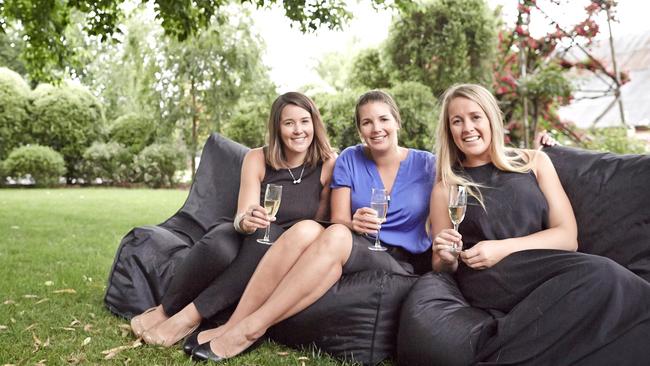
Eating Out
Don't miss out on the headlines from Eating Out. Followed categories will be added to My News.
Their surname is synonymous with wine — not only in the King Valley but throughout the country — and are involved in a family business that began when John Francis Brown planted 10 acres of riesling, muscat and shiraz vines in 1885.
More than 130 years later, his great-great-granddaughters are making and marketing the wines that bear his name.
But if you thought Katherine, Caroline and Emma Brown waltzed into their roles at Brown Brothers you’ll be corrected quicker than you can say nepotism.
“Both Emma and I have felt it might’ve been easier to cross out Brown at the top of our resumes and write Smith, when submitting to the business for our roles,” laughs Katherine, who is the first female winemaker in the family.
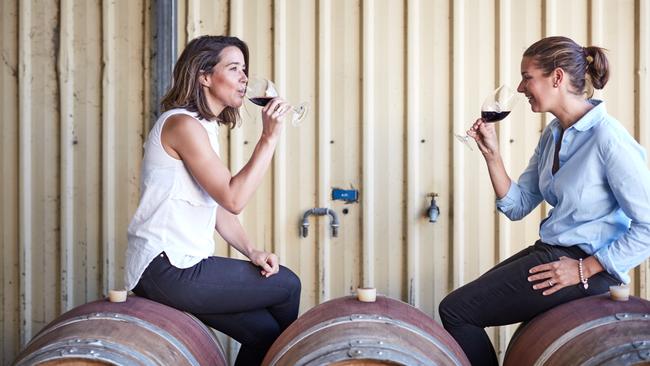
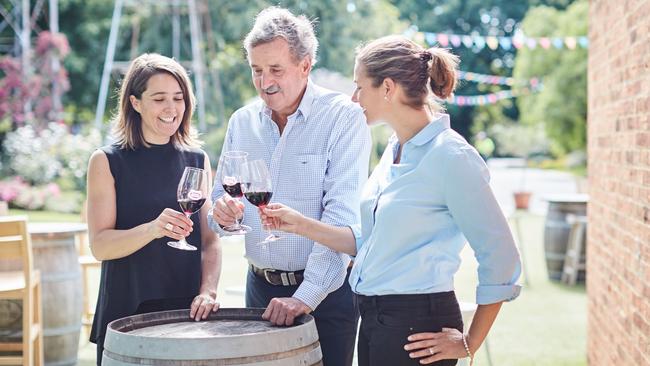
Along with Caroline, who looks after communications, and Emma in marketing, the three sisters are the fourth generation to join the business but say they felt no pressure from their dad, Ross, to come back and join the fold.
In fact, a family edict put in place a generation ago meant they all had to gain a university degree and work outside the business for five years to even be considered for a role.
“Dad’s favourite line — go screw up someone else’s business,” Katherine jokes.
“Go learn the ropes, see what it’s like to have someone else as a boss, and come back. It’s an opportunity to learn outside the business, to gain new skills.”
From a young age the three were involved in the family business, invited to be part of the yearly meeting in which the three Brown brothers’ family groups would discuss the future of the business.
“Just being around the family in a business sense, to know the right time to talk business and the right time to enjoy time together and learning that at a young age was important,” says Caroline, who joined the business just a year ago.
“We see ourselves as lucky — it’s a lot of pressure sometimes, but it’s a big responsibility to hand on to something to the next generation, better than how we got it.”
Throughout the King Valley there’s a similar story to be told, whether at Dal Zotto, where brothers Michael and Christian have taken over from their parents Otto and Elena in pioneering the prosecco for which the region is now famed, or at Pizzini, where Joel Pizzini has followed in his father Fred’s footsteps in tending to the one-time tobacco farm-turned-award-winning vineyard.
“It’s the Italian family values that hold us all together,” says Lidia Politini, who joined the family’s winery 2 ½ years ago after a career in fashion in Melbourne.
“This next generation, we have to continue to work in the business because who else is going to do it?”
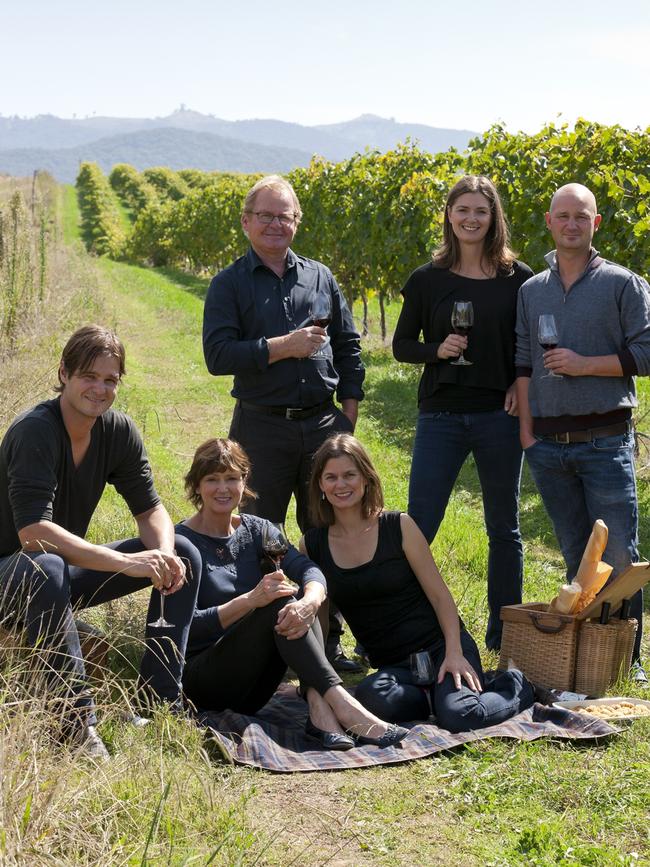
For Salvatore “Sam” Politini, who will soon celebrate his 85th birthday, seeing his children carry on celebrating the family’s Sicilian heritage through introducing drinkers to varietals such as grecanico and nero d’avola at their charming cellar door is a source of pride and achievement.
“The biggest pleasure there is in life, is family,” he says. “My family is now united, we work all together, that’s what you want. For me there is nothing more I want to do, to achieve, so for me, I’m very happy that they’re all in the company. If they do well it’s for them, not for me.”
At the King Valley’s first commercial vineyard John Darling is celebrating 100 years of Darling industry throughout the area — from the apple and tobacco his grandfather Frederick farmed to the grapes and wines of this father, Guy — while introducing his daughter Grace and her partner Luke to the business of growing grapes, making wines and selling them in the region and beyond.
From the early 1990s John returned to the vineyard to make wines with his father each vintage. “Though it was more slave labour than expert tutelage,” John says with a wry smile. “Luke might say the same thing about you now,” Grace says, laughing.
“There’s a difference between slave labour and invested labour,” John says.
“Having people on the place for the long term who want it to grow and prosper is hugely satisfying compared to having employees. And 100 years in the valley and wanting for that to continue, is nice, too.”
As the majority of the grapes grown on the vineyard are sold to other wineries, John says this affords them rare freedom to make wines they want and release them when they’re ready — the current riesling release, for instance, is 2013.
“We don’t make the same thing every year — we do what we want to do,” he says. “The grape growing is the main business, keeps us afloat, and the wine is what we want to do, with no accountants telling us to move stock or anything silly like that.”
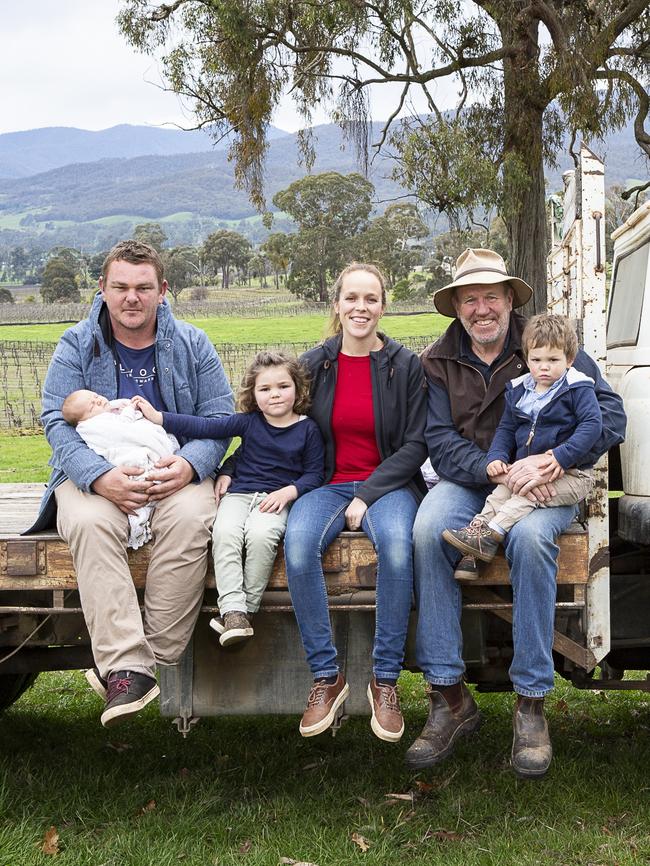
But with the next generation comes new ideas, and while Grace, who will take over the wholesale side of the business next year, still wants to keep the Darling label boutique, she sees scope for growth. “Maybe double our output,” she says.
“It’s a lot of work and we have to be serious about it now they are involved,” John says. “To make this a more sizeable enterprise.”
It was Brown Brothers from the late 1970s through 1990s that helped the King Valley’s transition from tobacco farming to grape growing, with many of the share farmers in the area planting grapes that were sold to the Milawa winery. At the same time many were making wine on the side that reminded them of their Italian roots.
For Otto Dal Zotto, that was the prosecco of his birth town, Valdobbiadene in the Italian Veneto region, which he planted for the first time in Australia in 1999. He made his first prosecco in 2004 — some 375 dozen bottles. Now, thanks to Australians’ love of this crisp, easy-drinking sparkling wine, the Dal Zottos have 40h under vine, and produce 60,000 dozen bottles of prosecco annually.
READ MORE:
THE TRASHY MEXICAN RESTAURANT THAT SCARRED ME
THE BEER FOR PEOPLE WHO DON’T LIKE BEER
MOST DELICIOUS FAMILY-FRIENDLY RESTAURANTS IN VICTORIA
The two brothers returned to work in the winery — Michael in 1998 and Christian in 2000 — and bought the business off their parents two years ago.
“There’s an immense sense of pride you have with creating a finished product that bears your name,” Michael says. “With it being part of a family, no matter what differences the workday might bring — every single member of the family cares about the name on the bottle.”
The name Pizzini is increasingly linked with sangiovese in the King Valley, with winemaker Joel Pizzini spearheading a five-year research project into the varietal on vineyards throughout the valley and who is conducting forensic soil analysis of the various parcels and blocks the family has under vine.
There was no other path for Joel, who knew from a young age he wanted to follow his father Fred’s footsteps and join him on the farm. His siblings — Carlo, Natalie and Nicole — are all involved in the business, as is mum Katrina, who runs the A Tavola! cooking school at the cellar door.
“They all had a choice, I hoped they’d bugger off, but no such luck,” Fred says with tongue firmly in cheek.
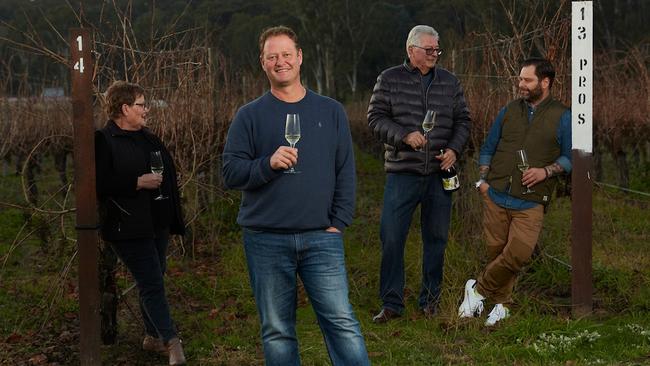
Since 2002 Joel has been making a large range of Italian varietals under the main Pizzini and newer Lana labels, from well-known styles such as pinot grigio and sangiovese to more obscure varieties such as sagrantino (a big, tannic red) and canaiolo (a Tuscan grape often blended with sangiovese). These are offered for tasting at the cellar door and are on the list at the family’s pub, the Mountain View Hotel, just down the road.
At the gateway to the King Valley, Sam Miranda might be a third-generation winemaker, but he’s the first-generation to make wine in the King Valley. In an area where “everyone’s related”, this made him and wife Rachel “the black sheep” of the area when they bought his family’s vineyard here in 2003.
“The King Valley has changed so much since then. Lots of thought has gone into the Prosecco Road idea, getting people to think about the region,” Sam says. “We built our cellar door, which set the benchmark but now with Christmont which is amazing, and Browns who are always looking to improve their offering, it’s a great area. We do all compete, but we’re all friendly. It’s about the region.”
Ross Bross coined the term “co-opetition” — to bring the various winemaking families and businesses together to work together on the Wines of the King Valley broader brand. It’s an approach that’s paying dividends, with King Valley now the fastest-growing region for wine tourism in Australia, with visitation up 141 per cent on last year with wine lovers drawn to the natural beauty and the quality of the Italian varietals — spearheaded by prosecco — made in the region.
But it’s not just the lure of grapes in a glass that have brought the next gen back from the big smoke.
Nathan and Brianna Munt have returned to Brianna’s childhood home where they set up King Valley Brewing three years ago on the property first farmed by her grandfather, then dad, Wally.
A converted tobacco kiln is now their brewery door, where the excellent German-style beers Nathan brews on site are served by the tasting paddle and pint, along with pizzas cooked by Wally and served by Brianna.
“I didn’t think I’d come back, but it’s such a beautiful part of the world,” Brianna says. “Why would we open just another brewery in Melbourne when there’s so much history here?”
Dan Stock travelled with the assistance of Tourism North East.

